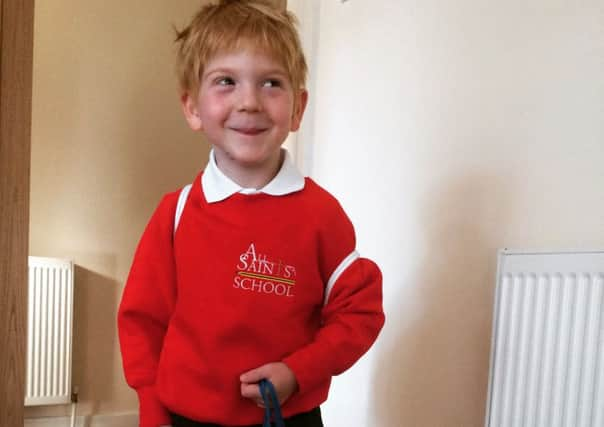Doctor’s plea for baby tests


Premature babies could be missing out on vital developmental health checks at age two, increasing the likelihood of significant disabilities being missed and specialist care being delayed, according to new research.
The Annual Report of the National Neonatal Audit Programme (NNAP), published by the Royal College of Paediatrics and Child Health was led by Bradford consultant Dr Sam Oddie.
Advertisement
Hide AdAdvertisement
Hide AdCurrently, all pre-term babies born more than 10 weeks early should be followed up around two years after their due date, to ensure that they are developing normally.
Butt his audit shows that, in many instances, neonatal units may not be doing this or that they are failing to record the details of the two year follow-up consultations, even when they have taken place.
Doctors say the lack of two-year follow up health data for 46 per cent of premature babies leaving neonatal units in England and Wales raises “major concerns” that disabilities caused by impairments such as cerebral palsy, visual impairment and intellectual developmental delay could be missed, only to become apparent later in their childhood.
The NNAP, which analysed data from over 86,000 newborns in England and Wales requiring neonatal care during 2014, also identified communication worries, with 11 per cent of families not recorded as having a consultation with a senior member of clinical staff within 24 hours of their baby’s admission to the neonatal unit.
Advertisement
Hide AdAdvertisement
Hide AdDr Oddie, clinical lead for the NNAP and consultant neonatologist at Bradford Royal Infirmary explained the findings.
“When a baby is born very prematurely, they are born before they are physically ready for life outside the womb. This means they often have health problems, which can extend into childhood,” says Dr Oddie.
“To ensure they are developing as they should be, it is crucial that these babies are monitored closely from birth, at least for the first couple of years. So the fact 46 per cent of babies had no developmental data entered at age two, is a major concern.
“Not only does this create added anxiety for parents about whether their child’s developmental milestones are being met, it also adds pressure to the health service as such children will need to begin a new pathway through the NHS.
Advertisement
Hide AdAdvertisement
Hide Ad“Another cause for concern in findings is the lack of recorded discussions with parents at some neonatal units.
“For a parent of a sick or premature baby, receiving a detailed explanation of their child’s illness and treatment is a much needed comfort in a sad, and often daunting, situation. So while the rate of timely consultation with parents has increased over the past two years (89 per cent in 2014 vs 84 per cent in 2013), our audit showed that one in ten families were not recorded as having a consultation with a senior member of the neonatal team within 24 hours of their baby’s admission. This has to change.”
Helen Sutcliffe’s son, Reggie, was born prematurely at 30 weeks in August 2011 weighing just two pounds.
Helen, from Halifax, says all babies should be screened at two years as Reggie was.
Advertisement
Hide AdAdvertisement
Hide Ad“My waters broke ten weeks early. My dad had died unexpectedly five days earlier and people said it was the stress, but the doctors didn’t think so,” she explains.
Reggie was doing very well initially but then became seriously ill with a condition called NEC, which affects the intestinal tissue.
He had to have emergency surgery in Liverpool and there were a couple of complications, but he made it through and spent the next six weeks recovering.
“Because of Reggie’s condition we were monitored quite closely but it wasn’t until he went to a child minder that we discovered Reggie had other problems. When I took him back to the consultant and asked to see his notes it was in there but it hadn’t been explained to us. When you are a new mum you really don’t know what milestones they should be hitting.
Advertisement
Hide AdAdvertisement
Hide Ad“Without these checks you just wouldn’t know if there were other developmental problems as a result of prematurity.
“Reggie has a few issues but he is really bright. he has juststarted school at the age of four and the teachers says he is doing better than a lot of the five year olds. We are really proud of him.”
Reggie now has a little brother, Remy, who went full term, and is a fit and healthy little boy.
And Helen, who works at Calderdale Hospital, is helping organise an event at the hospital on World Prematurity Day next Tuesday. She is also hoping to work with mums who have undergone premature births.
Advertisement
Hide AdAdvertisement
Hide Ad15 million babies are born too soon each year across the globe, that’s 29 babies every minute. Sadly around one million of these babies will not survive. In 2008 organisations and charities came together to raise awareness of the issue and began to celebrate World Prematurity Day, on 17 November. Since then the event has gone from strength to strength and is now celebrated by millions of people around the world.
For more information visit www.bliss.org.uk/world-prematurity-day-2015